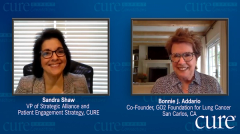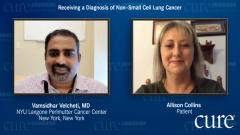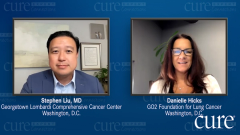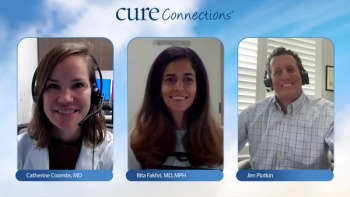
Discussing Biomarker Testing in NSCLC With Patients
Key opinion leaders explain how to discuss biomarker testing with non-small cell lung cancer patients, as well as the common questions they field.
Episodes in this series

Stephen Liu, MD: Do a lot of patients ask about the difference between blood and tissue testing?
Danielle Hicks: They absolutely do. You know, liquid biopsies and blood-based biopsies are sort of the new... sort of buzzwords and things that we’re hearing kind of creep up. And so, we do explain the differences. And I’m certain that you’ll do our job explaining the differences to me, but what we usually let [the patients] know is that although tissue is still sort of the standard of care, a lot of physicians—like you, who are able to specialize in particular lung cancer—we’ll run a blood sample by side, right? Because we know that if something shows up in the blood, then it is in the tumor. If it doesn’t show up in the blood, that doesn’t mean it’s not in the tumor. I don’t know if you want to explain that a little bit more scientifically from a clinical perspective, but...
Stephen Liu, MD: I think that’s perfect, Danielle. This is another area with a lot of terminology—liquid biopsy, circulating tumor DNA, cell-free DNA. We’re all talking about the same thing—you know, searching for biomarkers in a blood specimen. And the specific biomarkers we’re talking about here reflect changes in the DNA of the cancer that we can detect in the patient’s blood. That test is generally faster. Most platforms will take 1 to 2 weeks, whereas tissue testing may take somewhere in the order of 2 to 4 weeks.
And so, you’ll get that answer a little quicker, but the caveat that you pointed [out] is really critical—not just for patients but also [for] providers—that if we see something in the blood, we know that it’s there. We act on it; we leave it there, so it’s very specific. If we don’t see something in the blood, it could still be there, and we need to wait for that tissue testing. And so, the sensitivity isn’t quite as good. So, the specificity is very high. Sensitivity isn’t perfect. We see it in the blood and we go, “If we don’t see it in the blood, we’re waiting for the tissues’ results.” And it’s really important that we wait for those results before we start therapy. So, biomarkers are very important, but lung cancer is a disease that, unfortunately, as of now, is generally diagnosed at a late stage. You know, our lungs are very well designed. They compensate for quite a lot, and so, you can have a very large tumor without causing any symptoms.
In fact, a lot of fairly large tumors are only picked up incidentally, or by accident, or by chance. So generally, when I see a patient in my clinic, patients reaching out to you, they may have had symptoms going back quite a while. And so, when they get the diagnosis of lung cancer, understandably, you want to go, you want to start, you want to act, and it can be difficult to wait longer. We have a diagnosis. We know it’s lung cancer. There [are] drugs that are out there. But biomarker testing can take some time— sometimes 2, 3, 4 weeks. In your experience, how do patients and families react when they’re asked to wait for those results?
Danielle Hicks: Yeah, that’s a great question, because they do ask, and there is a lot of anxiety around that wait time for the results. I think in general, I would say that as we go through and explain sort of the purpose of the biomarker testing, and the benefit of the appropriate therapy, should you test positive for a biomarker, patients tend to relax a little bit because they are now able to understand. And we try to explain it to people all the time, and I had a physician tell me once that everybody’s lung cancer is unique and each lung cancer has its own unique sort of fingerprint, if you will. And until we can identify what that fingerprint looks like—unless, of course, a patient is symptomatic—then maybe you need to talk about doing something for that before, or suggest they speak with their doctors about doing something with that before. But otherwise, we’re generally able to sort of [get] through that education and empowerment sort of conversation [and] quell people’s anxieties about the wait time.
Stephen Liu, MD: I can speak for my colleagues. The oncologists are anxious, too. You know, we want to start here, but we’ve learned that we’re not looking for the fastest treatment; we’re looking for the best treatment, and we want to get it right the first time. And in lung cancer, in particular, the stakes are pretty high, and the sequence actually does matter. We’re still trying to figure out exactly why. But if a target is present, we have these oral targeted therapies that are very effective. And when we deliver them, they’re generally very safe; they work quite well.
If we don’t see a target, nowadays, our standard treatment is immunotherapy. If we start immunotherapy in a patient whose cancer has 1 of these biomarkers... One, the immunotherapy is not going to work very well for these subsets. For most of these, these biomarker positive cancers, immunotherapy is largely ineffective. But two, if we then find a biomarker and then start this targeted therapy, all of a sudden, it’s like a different drug. It’s much more toxic; it’s much more dangerous for sort of unclear reasons. So, it’s a little harder to walk back from immunotherapy. If we end up finding a biomarker, it’s better to get it right the first time.
Sometimes patients are symptomatic, and we need to start treatment. If we do, that is typical chemotherapy, not immunotherapy. And it’s just to sort of buy time until we get the biomarker, and then [we] move into what we think is the best treatment overall. But that patient is... It’s hard; it’s hard for everyone. And then, when you go to try to minimize those delays, we do, but we do have to wait for those results.
Danielle Hicks: Yeah, I agree, and I think you’re sort of... The analogy you used or the example you used around immunotherapies is a really important one because I think a lot of drug companies right now are doing—and historically since the first approval, have been doing—a really great job at sort of this direct-to-consumer marketing about these immunotherapies and their effectiveness.
What is not really translating through some of that direct-to-consumer marketing is the “who it’s right for” and the “when it’s right,” right? So, we do get a lot of questions from patients about waiting for the biomarker testing results versus what they deem as the miracle for all because of that marketing. So, I think it’s a really important point that you make.
Stephen Liu, MD: Danielle, you’re approached by a lot of patients with a new diagnosis of lung cancer. Are there other common questions that patients and caregivers ask?
Danielle Hicks: You know, yes, and they really [run] the gambit. It’s interesting; I was talking to one of my colleagues this morning, and we have [a] help line where patients call and no question is off the table. And every call is something different. So, we get a lot of questions about financing care—you know, “How do I pay for my cancer care?” Whether you’re a Medicare patient or your insurance is privately held, there are different plans, and it all works differently. So, we get a lot of questions about that.
[We also get] a lot of questions about the biomarker testing—particularly, when the biomarker testing should happen—and who specifically should be tested. And I know today, we’re talking about non-small cell, which is primarily where a lot of this biomarker work is happening, but the “when” on the biomarker testing, I think, is one of the biggest questions we get, as well. So, at diagnosis and then progression, and I’d love to hear your sort of views on the “when.”
Stephen Liu, MD: Yeah, absolutely. It’s got to be a fast... And if you find a target, it’s got to be frequent because as the cancers change, as we need to change our therapies, that needs to inform decisions with sort of repeat testing, [which is] absolutely critical.
Transcript edited for clarity.



